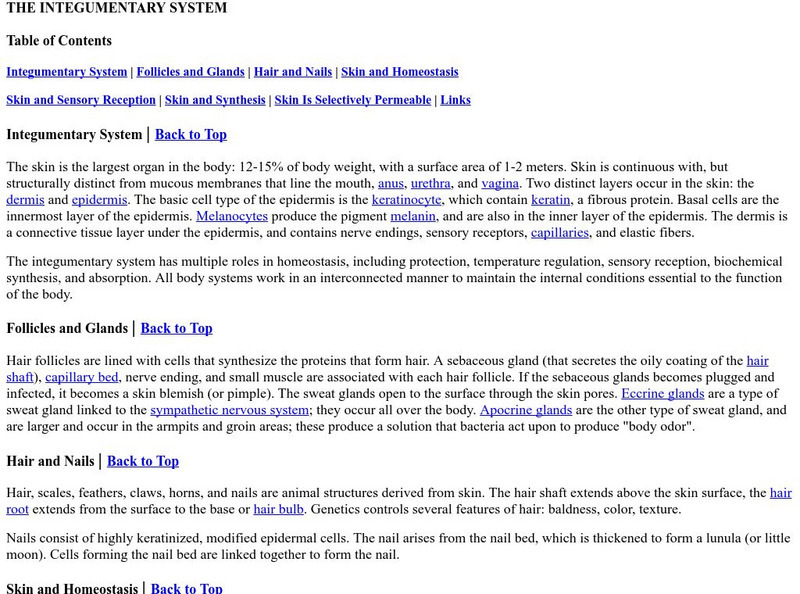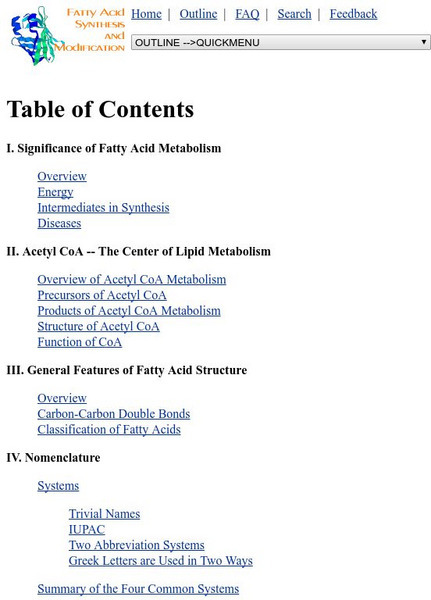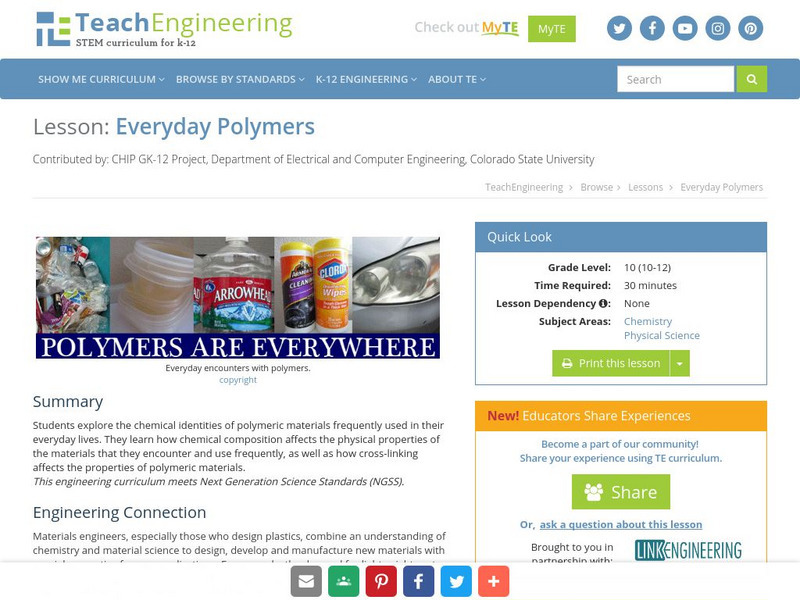Curated OER
2D Wavelet Transform
In this 2D wavelet transform worksheet, students compute 9 different types of problems related to using wavelets. They select a set of orthogonal filters, load in any image they want, and compute by the given command. Then, students...
Curated OER
Create a Travel Brochure
Students demonstrate an understanding of the contributions of the Ancient Roman civilization. They identify, study, and provide evidence for the significance of Roman citizenship and the spread of Christianity. Students then demonstrate...
Curated OER
The Creative Process
Students conceive and create works of visual art that demonstrate comprehension of how the communication of their ideas relates to the media, techniques, and processes they use. They initiate, define, and solve challenging visual arts...
Curated OER
Biogeochemical Cycles
Middle schoolers demonstrate comprehension of the energy sources of various cycles by completing mini stories. They demonstrate analysis of words by defining individual word parts and combining them to form definitions. Students...
Curated OER
7th Grade Math Circle Graphs
Seventh graders are able to develop (synthesis) pie graphs with the class and on their own. They are told that pie charts are a graphic representation of material that can be given in the form of parts of a whole by using...
Curated OER
Circle of Gold: Guided Reading
Students participate in 8 guided reading sessions in which they read the novel, Circle of Gold, by Candy Dawson Boyd. They focus on and discuss characterization, synthesis, analysis, and predicting. They complete journal entries and...
Curated OER
Synthesis Worksheet
In this synthesis worksheet, students read two or three articles on the same subject and summarize the main idea of each. Students then find at least three common points in the articles and write a paragraph synthesizing what they learned.
Curated OER
Main Idea and Supporting Details on Two Topics-Neeraj and Moths
Learners explore details, supporting details, and main idea statements. In this details and ideas lesson, students view two video segments and determine relevant details. Learners identify the main ideas and defend them.
Curated OER
Working with Wavelets
In this working with wavelets worksheet, students solve 7 various problems that include working with different wavelets in each. They compute the synthesis given two segments and y, describing what they observe. Then, students plot...
Curated OER
Cell Growth and Division
In this biology worksheet, 9th graders identify and explain what cell stay in inter-phase. Then they describe which stage of cell is the shortest and determine why that is true. Students also explain the process of mitosis.
Curated OER
What is Biocomplexity?
Students dicuss different aspects of biocomplexity. They demonstrate synthesis of complex concepts by creating before and after posters expressing how the concepts of biocomplexity have ben internalized. Students define the term...
Curated OER
Commonly Asked Questions on Vision and Color Perception
Learners commonly ask question about vision and color perception which may be difficult to answer without taking. They use this module that contains a list of questions which often arise when biology students are studying the nervous...
Curated OER
Protein Factory
Learners examine protein synthesis and how DNA is transcribed. For this investigative lesson students play a role in the messenger RNA when it creates nucleotides.
Curated OER
Chemistry
In this chemistry worksheet, students classify each chemical compound as a ketone, amine, aldehyde, or ether. Students also write a condensed formula and classification for the given organic products.
Curated OER
"Boy Meets Chemistry... and has a Reaction!"
Students identify the four main types of reactions: synthesis, decomposition, single replacement, and double replacement. They explore the four main types of chemical reactions through an analogy of "Boy Meets Girl" and then "act out"...
Curated OER
Spring Collecting and Identifying Bumble Bees
Young scholars collect bumble bees in the field, record data, pin and label specimens, answer conclusion questions, and send specimens to research leaders for verification. They improve their ability to work in research teams. Students...
Curated OER
Start with a Chart
Students use a given chart and the 50 state quarters to synthesize information about the 50 states and the dates that they were admitted into the union. Students complete a math worksheet while referring to the chart.
Michigan State University
Michigan State University: Introduction to Synthesis
Learn what synthesis is, why you might write a synthesis essay, and techniques for developing several types of synthesis essays. While this site is written for a college writing course, it is both useful and accessible for high school...
University of Toronto (Canada)
U. Of Toronto: Basic Principles of Marxian Economics [Pdf]
With all references made to Capital, this very advanced work can be read with Marx's texts, providing helpful insight and definition to the terms, ideas, and even format. Not for beginners, however.
Estrella Mountain Community College
The Integumentary System
The parts of the integumentary system are described along with their functions.
University of Utah
University of Utah: Fatty Acids Tutorial
This tutorial on fatty acids is presented in an outline format and features related informational links.
Other
Multimedia Schools: Moving Every Child Ahead the Big6
This article looks at applying the Big6 process to issues raised by No Child Left Behind legislation. The goal of the Big6 process is to improve performance by improving thinking through application of information technology skills. This...
Virtual Salt
Virtual Salt: Introduction to Critical Thinking
An introduction to the concept of Critical Thinking examines the true definition and gives examples where it can be used as a constructive force.
TeachEngineering
Teach Engineering: Everyday Polymers
Students explore the chemical identities of polymeric materials frequently used in their everyday lives. They learn how chemical composition affects the physical properties of the materials that they encounter and use frequently, as well...




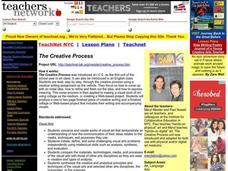








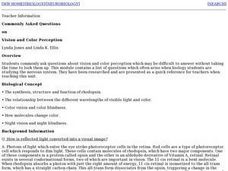





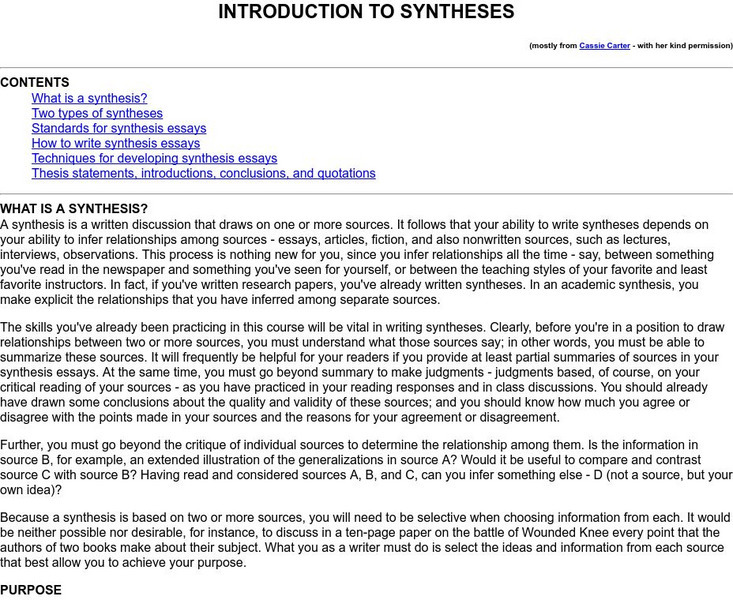
![U. Of Toronto: Basic Principles of Marxian Economics [Pdf] Website U. Of Toronto: Basic Principles of Marxian Economics [Pdf] Website](https://d15y2dacu3jp90.cloudfront.net/images/attachment_defaults/resource/large/FPO-knovation.png)
